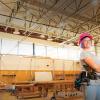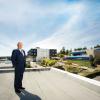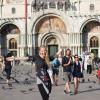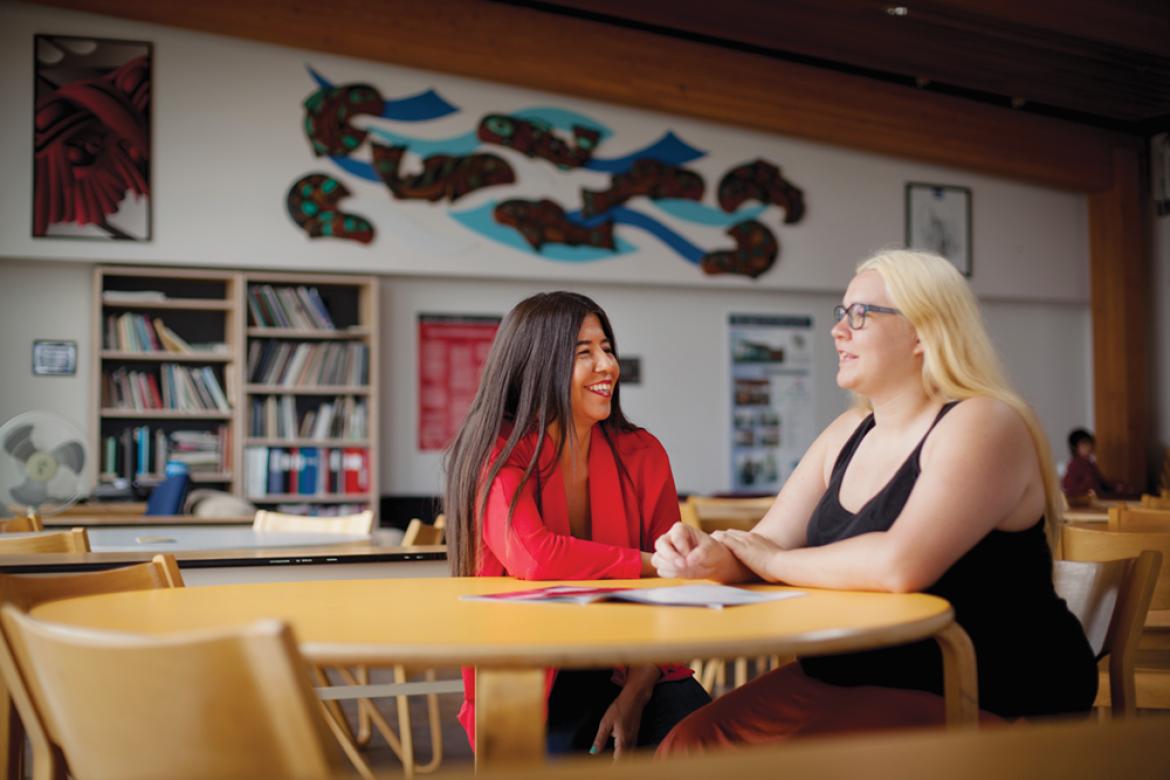
September 17, 2019 - 7:45pm
News happenings from the 2018-19 academic year at Vancouver Island University.
EleV Learning Partnership Continues to Grow
An innovative learning partnership headquartered at VIU is starting to take root. It’s been two years since EleV, a collaboration between VIU and Indigenous communities that is supported by the Mastercard Foundation, launched. The program, which aims to boost the number of Indigenous youth accessing post-secondary education, provides scholarships; wraparound supports such as Indigenous Education Navigators, who follow students throughout their journeys to help them succeed; and career advising to support the transition to the workplace.
Mandii Hopkins, a Criminology student, says that extra support has made all the difference for her. “The program has helped me by being there every step of the way, especially Emmy [Manson, Indigenous Education Navigator],” she says. “Emmy supports me in every way possible, and I will never be able to thank her enough. She is my family when I am at school.”
Dr. Sharon Hobenshield, Director of VIU’s Office of Aboriginal Education and Engagement, says the partnership continues to evolve as VIU engages with Indigenous communities and the different needs Nations face become more apparent.
“The Mastercard Foundation was always adamant that this pilot program exists to chart a better way forward and that it should adapt and change as we go in response to the needs we are seeing,” she says. “That is what we’ve been doing, with their support.”
Since 2017, the Education Navigators have been reaching out to communities to recruit students and identify barriers. As a result of these conversations, VIU is launching a student internship program in partnership with interested Indigenous communities.
“After the first year, we did some follow-up visits and communities were talking about the need to build internal capacity,” says Hobenshield. “The student interns help fill that need and in return, they receive valuable experiences.”
The next stage in the partnership is hiring an Indigenous Employment Navigator, who will help students with soft skill development, building resumés and networking. Nearly 80 students were funded in year two of the program, and 10 students have already graduated and moved on to the workforce.
Hobenshield is also excited to see awareness of EleV growing, both within VIU and in-community. “That is how we are going to succeed and draw more students in – by building relationships and increasing awareness,” she says.
VIU Mariners Make a Year to Remember
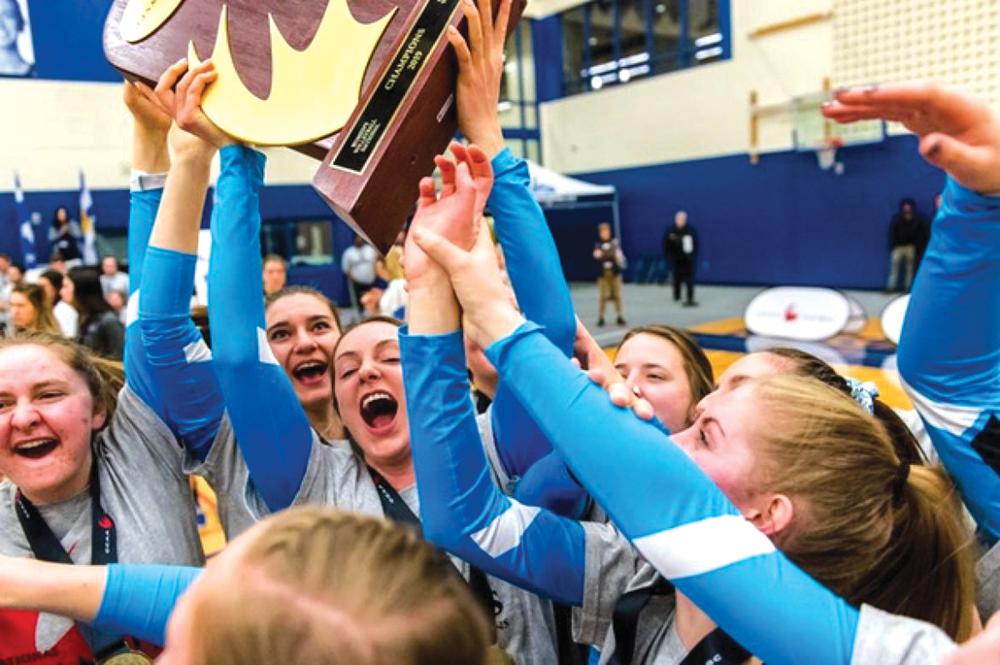
The VIU Mariners athletic department made history this year, bringing home a record-breaking number of gold medals.
The women’s and men’s basketball and volleyball teams, women’s soccer team and a member of the Mariners golf team all scored gold medals at the PACWEST provincial championships this year. The Mariners continued that momentum at nationals, sending five teams and bringing home two gold medals and one bronze.
“I don’t think any other school in the country has achieved the level of success we have this year at the national stage,” says Stephanie White, VIU’s Athletic Director. “There are many schools that have never gone to nationals, let alone won a medal. For us to do so well is incredibly significant.”
The women’s volleyball team set a new record for VIU by scoring the first-ever consecutive championship win at nationals. The men’s basketball team grabbed gold and the men’s volleyball team secured a bronze medal.
Not only has it been a significant year for medals, but the growth of each team has also been exponential. Two coaches who started with their teams only two years ago – Kevin Lindo, women’s soccer coach and Tony Bryce, women’s basketball coach – both won the PACWEST Coach of the Year award for their sport. Eighteen players received the PACWEST All-Stars Award, and Harry Fayle, a point guard for the men’s basketball team, received the Athlete of the Year Across All Sports award.
White says the new banners and trophies are the end result of the tireless hard work and dedication the players, coaches and support staff put into their sport.
“We love to win. We want to win as a program. But that’s not what we primarily focus on,” she says. “We focus on helping our student-athletes be successful whether in the classroom, in life or in sport. That’s what our program is about.”
New Course Sends Students into the Wild
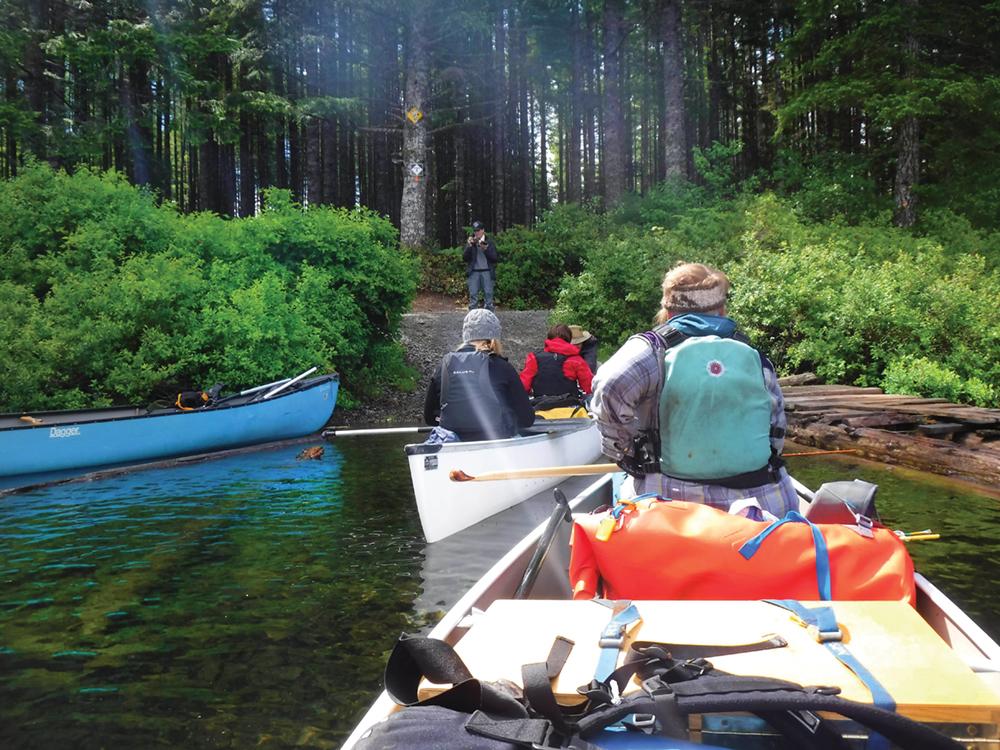
Exploring the wilderness can positively affect physical, psychological, social and emotional development in children and youth. However, few programs in Canada train professionals to facilitate wilderness exploration opportunities for youth. VIU Child and Youth Care Professor Stephen Javorski is filling that void.
Therapeutic Applications of Wilderness is open to both current students and professionals. Successful participants earn university credits as well as a flatwater paddling certification from the Recreational Canoeing Association of BC. The course includes classroom theory followed by an intensive 11-day canoeing and backpacking expedition through Strathcona Provincial Park – Vancouver Island’s largest park.
Students work in interdisciplinary teams to create therapeutic wilderness experiences that support the cognitive, emotional, social and spiritual development of program combines backcountry travel with character development through nature-based contemplative practices and advanced group management training for challenging populations. It aims to affect character development for youth by directly educating the young adults taking the undergraduate course and preparing those students to offer similar programing to youth in their home communities.
VIU and McGill Collaborate on Indigenous Education Initiatives
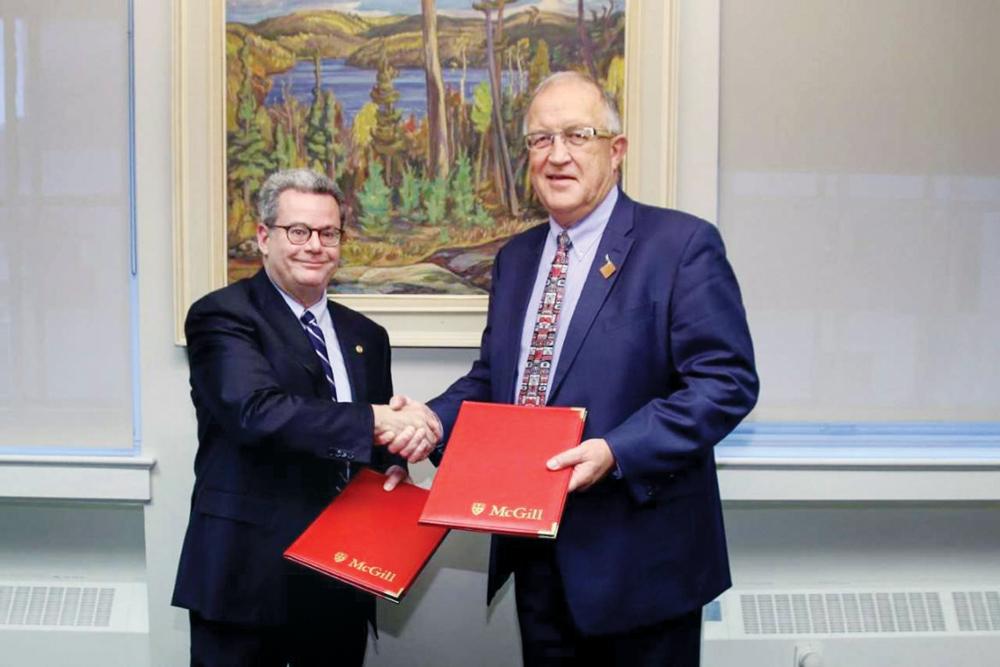
A deep and shared commitment to supporting the recommendations of Canada’s Truth and Reconciliation Commission have led McGill University and VIU to form a unique collaboration to create new opportunities in Indigenous studies.
The two institutions are exploring how they can work together to further support research and learning in the areas of Indigenous education and Indigenous studies.
“By working together, we can build bridges and learn from our different experiences,” says Dr. Christopher Manfredi, Provost and Vice-Principal Academic at McGill. “I look forward to seeing this important collaboration develop.”
A working group that includes representatives from both universities and Indigenous communities was formed last fall to discuss ideas and initiatives to collaborate on, such as new programs, research opportunities and seminars.
“We are looking at opportunities for student exchanges and ways we can learn from each other in how we provide education for Indigenous students,” says Dr. Carol Stuart, Interim Provost and Vice-President, Academic at VIU.
“Post-secondary institutions have a clear responsibility to build and further the process of reconciliation,” says Dr. Ralph Nilson, VIU President Emeritus. “We must learn from Indigenous communities. We must work together, sharing our knowledge and experiences and, in doing so, build understanding and heal relationships between Indigenous and non-Indigenous peoples for the betterment of Canada as a whole.”
Supporting Children through the Opioid Crisis
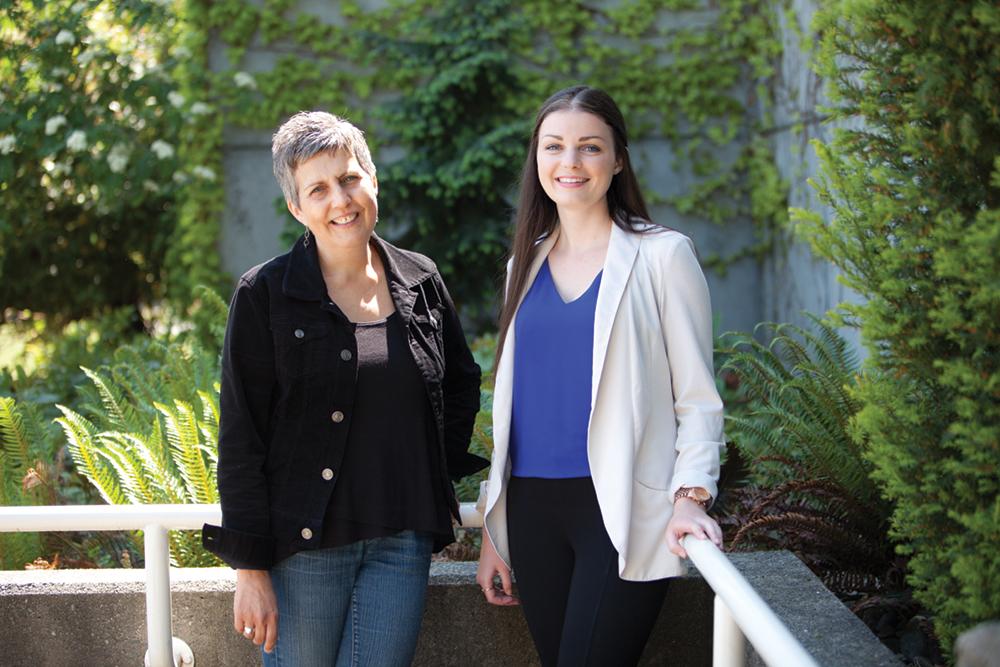
Almost every person in Canada is affected in some capacity by the opioid crisis, and yet until this year there was little support for children and youth affected by this epidemic.
VIU’s Centre for Community Outreach and Care (CCOC), operated by the Child and Youth Care (CYC) program, aims to fill that void in the Nanaimo community by offering support groups for children and youth. They are also hosting community dialogues with funding from the Canadian Institute for Substance Use Research.
“We created the community dialogues with the intention of creating a safe space for people to learn, listen and voice their experiences about the impact of the opioid crisis on children, youth and families,” says Teri Derksen, VIU CYC Program Coordinator. “With every event I attended, I learned something new. It shifted how I related to the issue and how I practice around the crisis. We hope it made the same impact on our community, broadening people’s perspectives about the epidemic and creating a better understanding of how to create positive change in our community.”
Emma Gillis spent her fourth year in the Child and Youth Care program creating space for community members, service providers and the general public to engage in these meaningful dialogues. So far, four dialogue sessions have taken place.
The children and youth support group sessions took place over a five-week span in partnership with the Nanaimo Community Hospice Society. Sophia Lazeroff, a third-year student, took the lead in contacting families and setting up the support groups. Youth aged 10-12 years old participated in the group sessions.
“We partnered with Hospice, which provided the space and a grief counsellor to support the process,” she says. “We created a safe place where children and youth could come and have their feelings validated. We took a strengths-based approach and offered coping strategies they could use. I feel the experience really honoured what they were going through and reassured them that this grieving is normal.”
The program will continue to work with the community to offer child and youth support groups as a constant service.
Cowichan Tribes Elders Teach Land-based Sustainability Course
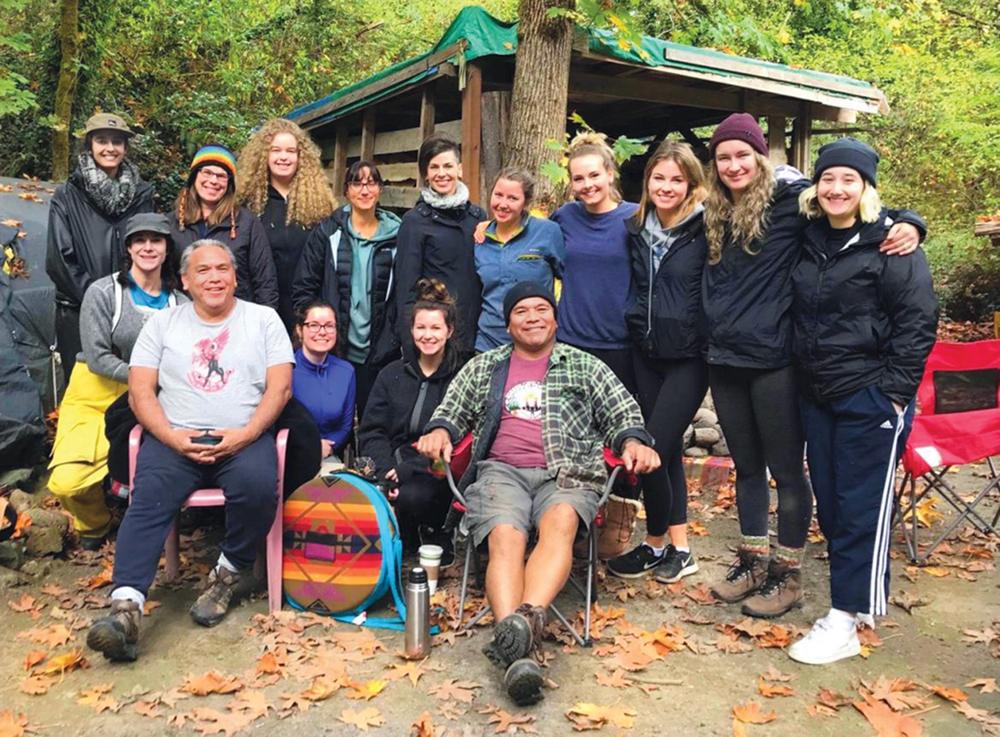
Enhanced connections to the land, a deeper appreciation for the culture of local First Nations communities and the desire to pass these experiences on to others were key takeaways for students enrolled in this year’s land-based teacher education course offered at VIU’s Cowichan campus.
Co-created and co-taught by Education Professor Nadine Cruickshanks and eight Cowichan Elders, the Sustainability and Teacher Identity course takes a holistic, experiential and land-based approach to learning about sustainability. Over eight weeks, the Elders guide students through a number of cultural experiences and protocol sessions, inspiring students to commit to continuing this work with their own students once they are teachers.
“It’s about breaking barriers and building bridges,” says Cruickshanks. “We can only move forward with the Truth and Reconciliation Commission’s calls to action –and the direction of the new BC curriculum – if we respectfully and intentionally involve connections to land, to First Peoples’ of this land, and to the true history of these teachings, injustices and significance.”
Cowichan Tribes Elder Rob George Qwiahwultuhw says teaching this course has been an empowering experience for him.
“It gave us a voice. Our people haven’t traditionally had a voice in the community, in education,” he says. “I think the students gained an understanding of what we’ve been talking about for years and years. It’s important because these students are going to change how things are talked about in the school system.”
Imagine VIU Campaign Launches
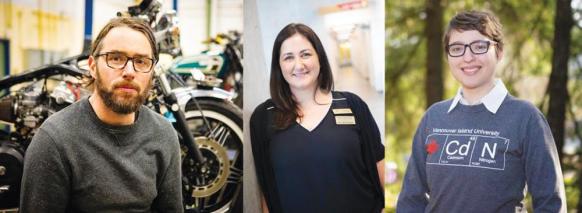
Three exciting new projects are expanding opportunities available to students at VIU’s Nanaimo campus.Thanks to funding from the federal and provincial governments, the Dr. Ralph Nilson Centre for Health and Science; an expanded and renovated Automotive, Marine and Trades Complex; and a District Geo-Exchange Energy System are increasing opportunities in key programs and introducing an innovative green technology on campus.
While students and employees are now enjoying these improved training and classroom spaces, VIU is seeking support to complete and equip the spaces with the tools and technologies students need. The institution is also seeking gifts to support the students learning in these new facilities.
“This is an opportunity to give VIU students – the future workforce –the best education possible,” says Brandon James Mason, a student in the Motorcycle and Marine Technician program. “Students in these programs are the future employees who will work in the hospitals and in the automotive shops.”
With a fundraising goal of $5.5 million, the campaign invites the community to make a gift to help support the education students receive in these important new facilities. Donations can go towards supporting the capital campaign in general, or be targeted towards student bursaries, awards and scholarships. Visit viu.ca/imagine for more details.
VIU Retrospective: 50 Years of Academic Programs
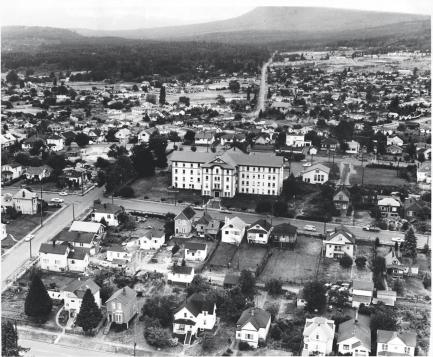
In 1969, Malaspina College, VIU’s predecessor institution, opened its doors at the old Nanaimo hospital site on Kennedy Street as a two-year transfer institution, enabling 680 students to earn university credits locally for the first time.
Retired History Professor Dr. Helen Brown, who was hired in 1970, says right from the beginning, the institution offered a wide range of courses in subjects such as physics, chemistry, biology, history, sociology and English. Even more significant was the transfer system that was put into place.
“We worked really hard on securing direct transfer of credits from institution to institution – so students who took Canadian history didn’t just get a generic history credit; it was recognized by other institutions as a Canadian history credit,” she remembers.
Nanaimo was at the forefront of lobbying efforts to establish the two-year university transfer program model in BC, which Brown says was unique in Canada. Around this time, community colleges formed across the province, including Selkirk, Okanagan, Capilano, Douglas and Cariboo.
The opening of Malaspina College was life-changing for the students who came, many of whom returned to Nanaimo to work, remembers Brown.
“Plunging students from small communities directly into a large university made it difficult for them to succeed,” she says. “Students who attended Malaspina first were well-prepared by the time they transferred for their third and fourth years.”
Malaspina quickly outgrew its first home and in 1971 melded with the Vocational Trade School at the Nanaimo campus’s current location, becoming the Malaspina College Vocational and Technical Institute and later Malaspina University-College in 1989.
Creating Space for Innovation in Powell River

As the need to diversify resource towns increases across the province, the traditional mill town of Powell River is stimulating its economy through supporting entrepreneurship and opportunities for creative innovation.
“It is not economically sustainable to rely on one large employer. The global economy is shifting,” says Julie Froekjaer-Jensen, Project Lead for the Creative Economy and Innovation Initiative and Professional Development and Training Program Coordinator at VIU’s Powell River campus.
The Powell River Creative Economy and Innovation Initiative is a sector development project tapping into the existing cultural sector and creating viable strategies for a community-based innovation and co-working hub. The initiative is a joint partnership between the City of Powell River, the Powell River Educational Services Society, the Tla’amin Nation, VIU and qathet Regional District.
“We have received funding to co-design and deliver an entrepreneurial ecosystem development program, which will consist of a variety of workshops and training opportunities to build entrepreneurial skills,” says Froekjaer-Jensen. “It will also teach students the stages of taking a concept through to launch.”
The program will be offered for 18 months beginning in September 2019. It isn’t a traditional university program with credits and a scheduled Monday to Friday timetable – instead, community members are invited to participate in as many workshops or training sessions as they can over the year and a half.
“Another component of this initiative is to create a co-working space for community, entrepreneurs and creatives to come together and share ideas,” says Froekjaer-Jensen. “The long-term outcome is to foster the growth of a responsive entrepreneurial culture that creates impactful and sustainable solutions in response to ongoing challenges, while creating the opportunity for new jobs and business growth in the creative economy.”
For more information, visit prinnovationhub.com.
For the Love of Snow
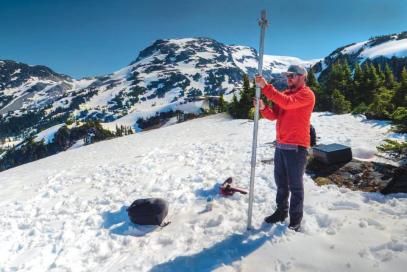
A VIU professor and undergraduate student are using drone technology to fill a science knowledge gap on stream flows.
Trekking through snow and ice in the high alpine regions of BC’s coastal mountains, loaded with specialized tools used to take core snow samples, is a labour-intensive job. VIU Geography Adjunct Professor Dr. Bill Floyd, the leader of VIU’s Coast Hydrology and Climate Change Research Lab, along with VIU undergraduate student Trevor Dickinson, hope to speed up the way these important measurements are taken in unique alpine forested areas.
“Most people don’t give a second thought to the snow way up in the mountains, but it is critical to water supply, fish, forest ecosystems and our economy,” explains Floyd.
Floyd hopes by using the drones they will be able to expand their ability to measure snow depth in a more accurate way over tens of hectares at a time.
“How we do that is by flying a double grid, back and forth with a camera angle of 70 or 80 degrees and an overlap of 70 or 80%,” explains Dickinson. “The drone takes numerous pictures at different angles, from which we can create a 3D model using software to tie all the photos together.”
Drone technology combined with remote sensing measurements will provide an unprecedented amount of data to estimate the volume of water stored in the snowpack.
Library Digitizes Historical Documents
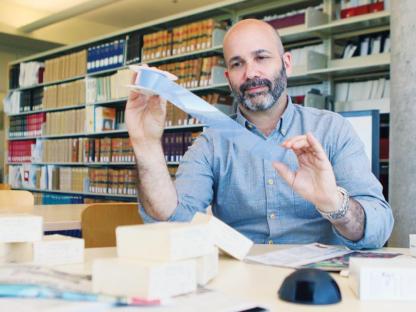
VIU Library is carefully and selectively digitizing the content on their bookshelves, making it accessible to a global audience.
Following a digitization project last summer when employees archived the Nanaimo Pride Society’s historical content, the library received a $40,000 grant to digitize long-ago issues of the Nanaimo Daily Free Press (1874-1928) and Cowichan Leader (1905-1928).
Both newspapers document contemporary events and prevailing social and cultural norms. By their nature, these sources reflect the experiences and perspectives of European settlers. A digitized record that is widely available allows for consideration of what stories are and are not present, says University Librarian Ben Hyman.
“Creating an easily searchable record of Nanaimo’s history is a step towards enabling researchers, students and the local community to learn about the wrongs done in our communities, acknowledge harm and take steps toward reconciliation,” says Hyman.
Also last year, VIU was one of 21 successful candidates from 213 applications to receive funding from Libraries and Archives Canada and the National Heritage Digitization Strategy to digitize collections for the preservation of Canadian cultural heritage.
The library is digitizing 38 historic texts and six maps from its Special Collections. The collection features naval expeditions along the Northwest Passage, including narratives of the journeys through what became Canada. Missing from these texts is representation of Indigenous perspectives and contexts.
“Indigenous voices are scarce in records of this kind – even when the subject is ‘ethnographies of Indigenous Peoples’ – so in an effort to elevate Indigenous voices with respect to these narratives, VIU Library will invite Elders from local communities to be aware of and to reflect on selected works and passages,” says Hyman.
The Library aims to continue finding ways to decolonize historical information and build upon its capacity to provide open-access content.
Tags: community | Indigenous | VIU Magazine | VIU Mariners


